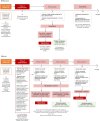The Ethical Obligation for Research During Public Health Emergencies: Insights From the COVID-19 Pandemic
- PMID: 38153559
- PMCID: PMC10904511
- DOI: 10.1007/s11019-023-10184-6
The Ethical Obligation for Research During Public Health Emergencies: Insights From the COVID-19 Pandemic
Abstract
In times of crises, public health leaders may claim that trials of public health interventions are unethical. One reason for this claim can be that equipoise-i.e. a situation of uncertainty and/or disagreement among experts about the evidence regarding an intervention-has been disturbed by a change of collective expert views. Some might claim that equipoise is disturbed if the majority of experts believe that emergency public health interventions are likely to be more beneficial than harmful. However, such beliefs are not always justified: where high quality research has not been conducted, there is often considerable residual uncertainty about whether interventions offer net benefits. In this essay we argue that high-quality research, namely by means of well-designed randomized trials, is ethically obligatory before, during, and after implementing policies in public health emergencies (PHEs). We contend that this standard applies to both pharmaceutical and non-pharmaceutical interventions, and we elaborate an account of equipoise that captures key features of debates in the recent pandemic. We build our case by analyzing research strategies employed during the COVID-19 pandemic regarding drugs, vaccines, and non-pharmaceutical interventions; and by providing responses to possible objections. Finally, we propose a public health policy reform: whenever a policy implemented during a PHE is not grounded in high-quality evidence that expected benefits outweigh harms, there should be a planned approach to generate high-quality evidence, with review of emerging data at preset time points. These preset timepoints guarantee that policymakers pause to review emerging evidence and consider ceasing ineffective or even harmful policies, thereby improving transparency and accountability, as well as permitting the redirection of resources to more effective or beneficial interventions.
Keywords: Medical research ethics; Non-pharmaceutical interventions; Pandemic; Public health emergency; Public health research ethics.
© 2023. The Author(s).
Conflict of interest statement
V.P. receives research funding from Arnold Ventures through a grant made to UCSF, and royalties for books and writing from Johns Hopkins Press, MedPage, and the Free Press. He declares consultancy roles with UnitedHealthcare and OptumRX; He hosts the podcasts, Plenary Session, VPZD, Sensible Medicine, writes the newsletters, Sensible Medicine, the Drug Development Letter and VP's Observations and Thoughts, and runs the YouTube channel Vinay Prasad MD MPH, which collectively earn revenue on the platforms: Patreon, YouTube and Substack.
Figures
Similar articles
-
Attributes of national governance for an effective response to public health emergencies: Lessons from the response to the COVID-19 pandemic.J Glob Health. 2022 Jul 6;12:05021. doi: 10.7189/jogh.12.05021. J Glob Health. 2022. PMID: 35787525 Free PMC article.
-
The future of Cochrane Neonatal.Early Hum Dev. 2020 Nov;150:105191. doi: 10.1016/j.earlhumdev.2020.105191. Epub 2020 Sep 12. Early Hum Dev. 2020. PMID: 33036834
-
Communication to promote and support physical distancing for COVID-19 prevention and control.Cochrane Database Syst Rev. 2023 Oct 9;10(10):CD015144. doi: 10.1002/14651858.CD015144. Cochrane Database Syst Rev. 2023. PMID: 37811673 Free PMC article. Review.
-
Challenges to biobanking in LMICs during COVID-19: time to reconceptualise research ethics guidance for pandemics and public health emergencies?J Med Ethics. 2022 Jul;48(7):466-471. doi: 10.1136/medethics-2020-106858. Epub 2021 May 12. J Med Ethics. 2022. PMID: 33980656 Free PMC article.
-
Non-pharmaceutical public health interventions for pandemic influenza: an evaluation of the evidence base.BMC Public Health. 2007 Aug 15;7:208. doi: 10.1186/1471-2458-7-208. BMC Public Health. 2007. PMID: 17697389 Free PMC article. Review.
References
-
- Abaluck, Jason, Laura H. Kwong, Ashley Styczynski, Ashraful Haque, Md. Alamgir Kabir, Ellen Bates-Jefferys, Emily Crawford, Jade Benjamin-Chung, Shabib Raihan, Shadman Rahman, Salim Benhachmi, Neeti Zaman Bintee, Peter J. Winch, Maqsud Hossain, Hasan Mahmud Reza, Abdullah All Jaber, Shawkee Gulshan Momen, Aura Rahman, Faika Laz Banti, Tahrima Saiha Huq, Stephen P. Luby, and Ahmed Mushfiq Mobarak. 2022. Impact of community masking on COVID-19: A cluster-randomized trial in Bangladesh. Science 375 (6577): eabi9069. 10.1126/science.abi9069. - PMC - PubMed
-
- Adebamowo, Clement, Oumou Bah-Sow, Fred Binka, Roberto Bruzzone, Arthur Caplan, Jean-François Delfraissy, David Heymann, Peter Horby, Pontiano Kaleebu, and Jean-Jacques Muyembe Tamfum. 2014. Randomised controlled trials for Ebola: practical and ethical issues. The Lancet 384 (9952): 1423–1424. 10.1016/S0140-6736(14)61734-7 - PMC - PubMed
-
- Ali Karim, Azher Tanweer, Baqi Mahin, Binnie Alexandra, Borgia Sergio, Carrier François M, Cavayas Yiorgos A, Chagnon Nicolas, Cheng Matthew P, Conly John, et al. Remdesivir for the treatment of patients in hospital with COVID-19 in Canada: A randomized controlled trial. CMAJ. 2022;194(7):E242–e251. doi: 10.1503/cmaj.211698. - DOI - PMC - PubMed
-
- Arabi Yaseen M, Mandourah Yasser, Al-Hameed Fahad, Sindi Anees A, Almekhlafi Ghaleb A, Hussein Mohamed A, Jose Jesna, Pinto Ruxandra, Al-Omari Awad, Kharaba Ayman, et al. Corticosteroid Therapy for Critically Ill Patients with Middle East Respiratory Syndrome. American Journal of Respiratory and Critical Care Medicine. 2018;197(6):757–767. doi: 10.1164/rccm.201706-1172OC. - DOI - PubMed
-
- Baden Lindsey R, El Sahly Hana M, Essink Brandon, Kotloff Karen, Frey Sharon, Novak Rick, Diemert David, Spector Stephen A, Nadine Rouphael C, Creech Buddy, et al. Efficacy and Safety of the mRNA-1273 SARS-CoV-2 Vaccine. New England Journal of Medicine. 2020;384(5):403–416. doi: 10.1056/NEJMoa2035389. - DOI - PMC - PubMed




